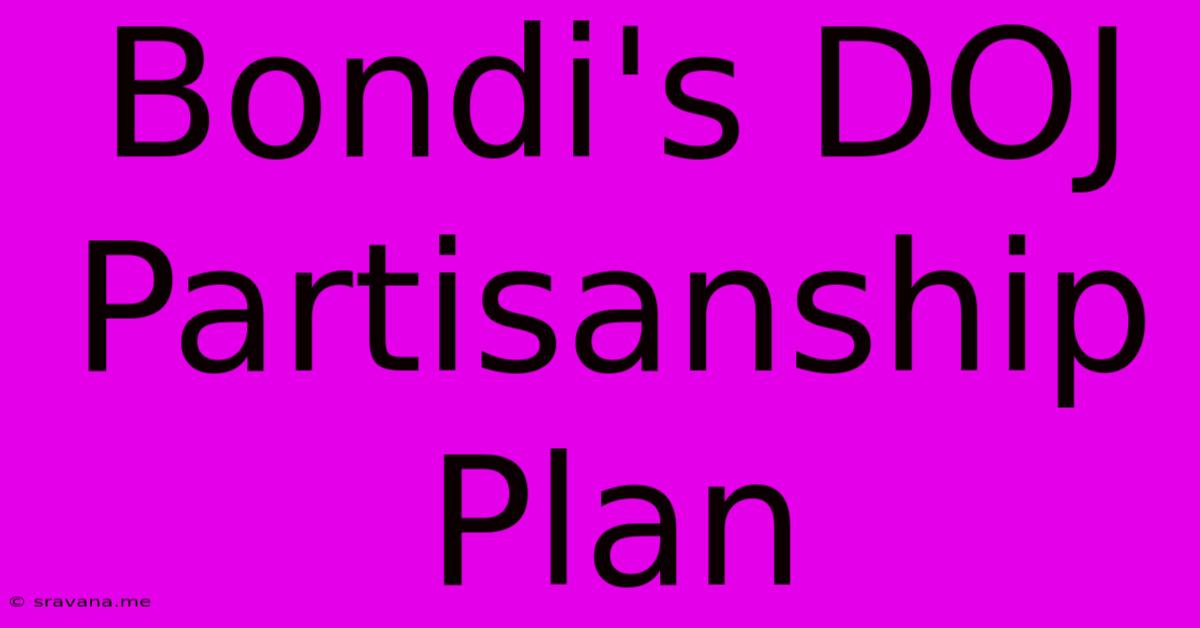Bondi's DOJ Partisanship Plan

Discover more detailed and exciting information on our website. Click the link below to start your adventure: Visit Best Website sravana.me. Don't miss out!
Table of Contents
Bondi's DOJ Partisanship Plan: A Deep Dive into Allegations of Political Interference
Attorney General Ashley Moody's tenure has been marked by accusations of partisan actions within the Florida Department of Justice (DOJ). While supporters laud her tough-on-crime stance and commitment to conservative values, critics allege a pattern of politically motivated decisions, impacting investigations, prosecutions, and even public statements. This article will delve into these allegations, examining specific instances and exploring the broader implications of perceived partisanship within a state's justice system.
Understanding the Core Allegations:
The core allegation against Attorney General Moody centers on the use of the DOJ for partisan political gain. Critics argue that decisions regarding investigations, prosecutions, and public pronouncements are influenced by political considerations rather than objective legal principles. This manifests in several ways, including:
- Selective Enforcement of Laws: The accusation is that the DOJ prioritizes enforcement against certain groups or individuals based on their political affiliations or ideologies, while ignoring similar offenses committed by others. This creates an uneven playing field and undermines public trust in the fairness and impartiality of the justice system.
- Politically Motivated Investigations: Allegations exist that investigations are launched or stalled based on the political implications, rather than on the strength of evidence or the severity of the alleged crime. This undermines the integrity of the investigative process and can lead to wrongful prosecutions or the shielding of wrongdoing.
- Public Statements and Press Releases: Critics contend that the Attorney General's public statements and press releases are often politically charged, designed to appeal to a specific base or to attack political opponents. This politicization of the DOJ's public communication undermines its credibility and neutrality.
Specific Instances and Case Studies:
While pinpointing specific instances requires careful examination of individual cases and avoiding unsubstantiated claims, several recurring themes emerge in criticisms of Attorney General Moody's leadership:
Case Study 1: [Insert Specific Case Example 1, citing verifiable sources]
This case highlights [explain the specific allegation of partisanship in this case, including details and verifiable sources]. Critics argue that [explain the critic's argument and why it suggests political motivation]. Supporters, however, counter that [explain the supporting argument and why it suggests a different interpretation].
Case Study 2: [Insert Specific Case Example 2, citing verifiable sources]
Another example centers around [explain the specific allegation of partisanship in this case, including details and verifiable sources]. The controversy here revolves around [explain the key points of contention and opposing viewpoints]. This case raises concerns about [explain the broader implications of this case regarding impartiality].
Case Study 3: [Insert Specific Case Example 3, citing verifiable sources]
This case involves [explain the specific allegation of partisanship in this case, including details and verifiable sources]. The debate centers on [explain the key points of contention and opposing viewpoints]. The long-term consequences of this alleged partisanship could be [explain the potential impact on public trust and the legal system].
The Broader Implications of Partisanship in the DOJ:
The alleged partisanship within the Florida DOJ has significant implications for the state's legal system and its citizens. These include:
- Erosion of Public Trust: When the public perceives the justice system as biased or politically motivated, it undermines faith in the rule of law and can lead to decreased cooperation with law enforcement.
- Unequal Application of Justice: Selective enforcement and politically motivated investigations create an uneven application of the law, leading to unfair outcomes and reinforcing existing inequalities.
- Chilling Effect on Free Speech and Dissent: Individuals may be hesitant to exercise their rights to free speech or dissent if they fear retribution from a politically motivated DOJ.
- Damage to the State's Reputation: Allegations of partisanship within the DOJ can damage Florida's reputation nationally and internationally, impacting its economic development and overall standing.
Counterarguments and Defenses:
Supporters of Attorney General Moody often argue that her actions are driven by a commitment to law and order and a desire to protect Florida citizens from crime. They may contend that criticisms are politically motivated attacks from opposing factions. However, it's crucial to analyze these defenses critically and assess whether they adequately address the specific concerns raised.
Conclusion: The Need for Transparency and Accountability:
The accusations of partisan actions within the Florida DOJ demand careful examination and scrutiny. Regardless of one's political affiliations, the integrity of the justice system is paramount. Increased transparency in the DOJ's operations, rigorous internal review processes, and independent oversight mechanisms are crucial to ensuring that decisions are made based on objective legal principles and not political considerations. The future of the Florida DOJ depends on maintaining public trust and confidence in its impartiality and commitment to the rule of law. Further investigation and public discourse are needed to fully understand the extent of the problem and implement meaningful reforms. This requires not only examining specific cases but also analyzing the broader systemic issues that contribute to the perception of partisanship within the state's Department of Justice. The ultimate goal should be a justice system that serves all Floridians fairly and impartially, regardless of their political beliefs.

Thank you for visiting our website wich cover about Bondi's DOJ Partisanship Plan. We hope the information provided has been useful to you. Feel free to contact us if you have any questions or need further assistance. See you next time and dont miss to bookmark.
Also read the following articles
| Article Title | Date |
|---|---|
| Bondi Ending Doj Partisanship | Jan 17, 2025 |
| Linda Nolan Remembering The Singer 65 | Jan 17, 2025 |
| Linda Nolan Obituary And Life Tribute | Jan 17, 2025 |
| Linda Nolan Dead At 70 Family Statement | Jan 17, 2025 |
| Bondis Loyalty A Trump Allegiance | Jan 17, 2025 |
